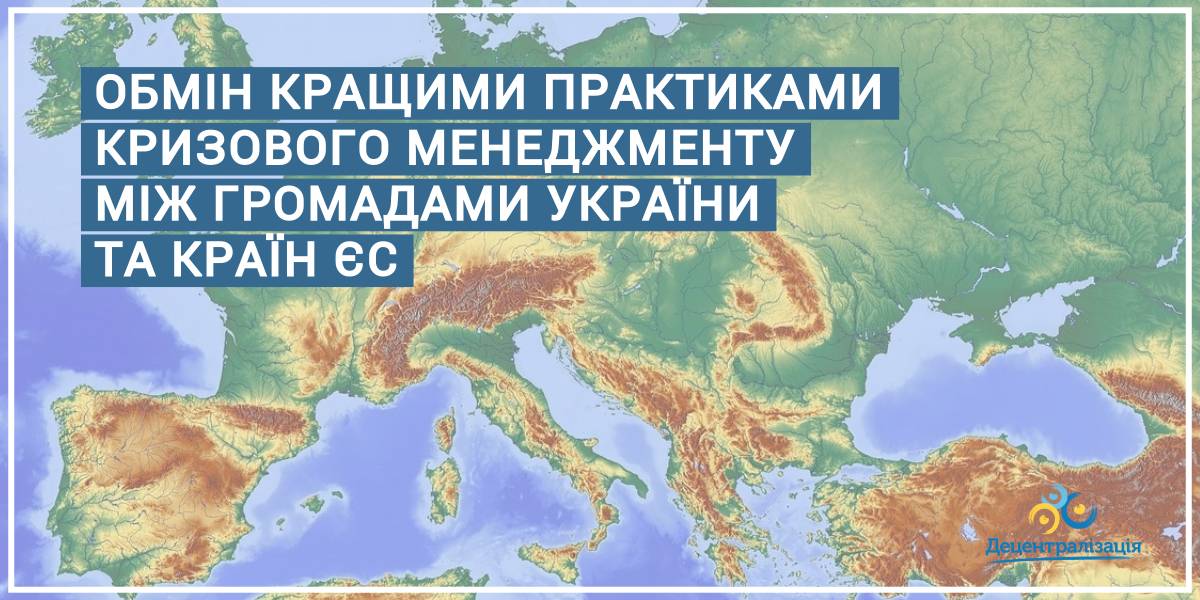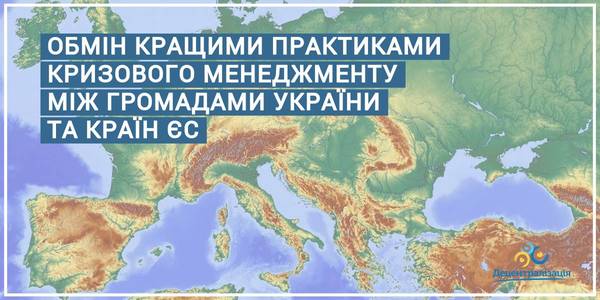U-LEAD with Europe launched a series of webinars on exchange of best practices of crisis management between the hromadas of Ukraine and the EU countries
Since March 12, 2020, Ukraine has been a part of the global community on quarantine. The pandemic has required everyone to change the usual routines and adapt to the new style of life, the one where healthcare is a top priority. The adaptation as such was and still is not easy, especially for the local authorities who interact with citizens directly. Professionals around the world are actively sharing expertise and attempt to find the best and most suitable approaches to safeguard the population against the COVID-19.
As a response to this challenge, U-LEAD with Europe has launched a series of webinars to connect the Ukrainian local authorities with their counterparts from the EU countries to exchange best practices in manage a crisis on the ground.
The first such webinar took place on April 10, 2020 gathering 51 Ukrainian participants. Vladimir Prebilič, Mayor of Kočevje Municipality, Slovenia, has opened the webinar series with the experience of his municipality in resisting the COVID-19 crisis. Being the biggest in size municipality in Slovenia, Kocevje applied the massive testing approach. “Our strategy was to test as many people as possible at the very beginning of the pandemic to break the contagion chain. Out of 500 tested people, we found 3 positive and put in quarantine an additional 100 people,” said the mayor.
Certain measures are common for many municipalities. This includes creating conditions for basic social security, healthcare provision to most population, maintaining law and order, coordinating all activities, and supporting the local entrepreneurship. To implement these the Kocevje municipality launched an informational campaign with a hotline to consult the population and local entrepreneurs on the quarantine measures, a website, and social media profiles and set up a civic protection headquarters engaging firefighters, red cross volunteers, and other human resources.
Although, the coordination was not all that smooth, especially when it came down to coordinating efforts of the central and local authorities. As an example, Mr. Prebilič brought up the central government measure obliging citizens to wear masks in public places, yet they were either too expensive or not available at all. Hence, the Kocevje municipality has turned to the local entrepreneurs to produce masks and managed to freeze the price for them agreeing that the municipality partly compensates the costs. Later, the municipality made a similar deal with a local chemical plant to produce sanitizers.
Kocevje started getting all the necessary equipment long before the spark of the epidemic and organized food delivery for the most vulnerable groups, still, Vladimir Prebilič believes they could have prepared better for the crisis and made better use of the available resources.
Speaking of the Ukrainian approach, Taras Shapravskyi, Bucha AH Deputy Mayor, said that their municipality has gone a similar way to Kocevje. Namely, Bucha municipality organized an information campaign, provided protection for doctors and launched food delivery to the vulnerable. Additionally, Bucha authorities have initiated numerous charity campaigns, encouraging people to people contacts. This, for example, helped to bring medics to work in the times of barred public transport. One of the local entrepreneurs has for free provided the city with sanitizing stuff.
Once the floor was opened for discussion, the Ukrainian participants expressed interest in the aspect of budgets. Bohdan Kyrlyk asked whether Kocevje faced any troubles with covering the utilities and if there were any debts for nonpayment. Mr. Prebilič agreed that it was indeed a crucial issue to address during the crisis and mentioned that it was vital for the entrepreneurs who were forced to halt operations. Kocevje municipality calculated the price for covering the utilities for the period of quarantine, which amounted to roughly 40 000 EUR and gathered the entrepreneurs to jointly decide on how to best spend this money: for the municipality to fully сover the utilities or to use this money later as an investment into business climate. The joint decision was to use most of the money for the investments since the business prefers to work and earn itself rather than just receive the money from the municipality. However, to withstand the crisis they would get a discount for the utility payments, namely businesses who haven’t worked for an entire month get a 70% discount, businesses that did work – 30%. Besides, the Slovenian municipality has set up a special COVID-19 account, to keep this money to use as investments in the future as the most important phase comes after the crisis.
Another question touched upon the massive disinfection of public spaces. Kocevje closed the parks and controlled people moving around but unlike Ukraine, it didn’t massively disinfect public places because it’s inefficient as places get “dirty” again too quickly. Although the municipality did consider sanitizing the multistory buildings. Residents of these buildings are co-owners of the buildings, so the municipality fixed and subsidized by the municipality price for sanitizers which allowed the residents to disinfect their buildings themselves. “I’ve learned that it’s best to engaged people as much as possible as they participate in decision making so they value this cooperation more,” stressed Vladimir.
As for the support of the unemployed, Mr. Prebilič mentioned a special law in Slovenia that confirms employees getting 70% of their wages from the state when a company is forced to shut down. The Kocevje mayor reminded of the lesson from the 2008 crisis – it’s best for the state to temporarily support the people who must temporarily stay home because they would have a workplace to return once the crisis is over as opposed to creating new jobs. Slovenia allocated 1.5 BLN EUR to support those who lost their jobs in crisis.
The next webinar is taking place on April 17 and the discussion will center on Municipality management on a day-to-day basis.

Share the news:
14 August 2025
Кращі практики цивільного захисту ЄС: дорожня карта для українських громад
Кращі практики цивільного захисту ЄС: дорожня...
Європейський цивільний захист — це узгоджена система, у якій професійні служби та волонтери/-ки працюють за спільними...
14 August 2025
"Живий музей": Одеська область презентує цифрову платформу для збереження культурної спадщини
"Живий музей": Одеська область презентує...
Агенція регіонального розвитку Одеської області (АРР) спільно з Одеським обласним центром української культури...
14 August 2025
«Переходимо до реалізації програми підтримки прифронтових регіонів» — Олексій Кулеба
«Переходимо до реалізації програми підтримки...
Уряд розпочинає практичну реалізацію Програми підтримки прифронтових регіонів, створеної за ініціативи Президента...
13 August 2025
Культурний профіль громад Сумщини: 27 історій про унікальність регіону
Культурний профіль громад Сумщини: 27...
Агенція регіонального розвитку Сумської області за підтримки Швейцарії у межах швейцарсько-українського проєкту...

